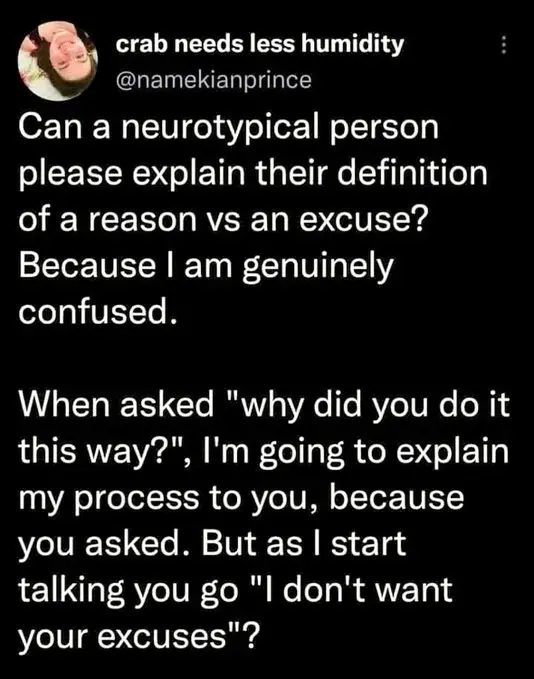this post was submitted on 26 Oct 2024
599 points (95.9% liked)
Ausome Memes
572 readers
3 users here now
A community for memes and humorous images that may be appreciated by autistic people, not necessarily autism-related memes.
Instance description for federated visitors
Rules
- Follow instance rules
- Please use the Lemmy cross-post option when applicable
- No political memes.
- Rules may adapt as the community grows.
founded 5 months ago
MODERATORS
you are viewing a single comment's thread
view the rest of the comments
view the rest of the comments

So, preface - not neurotypical, but I dont really struggle with this sort of thing personally. At least I think so lol.
An excuse is a reason. One dictionary definition is "a reason that you give to explain why you did something wrong." When you have done something wrong, people don't usually want the reasons. They want contrition, or help resolving it. Also note another dictionary definition - "a false reason that you give to explain why you do something." There is a perception that any reason given after doing something wrong may well be false, intended to deflect blame rather than genuinely explain. In general, there are times when it is appropriate to explain, and times when it is not.
It's frustrating that someone would directly ask why you did something while not wanting an answer, but when people are stressed or frustrated - i.e. when something has gone wrong - they do sometimes just lash out with questions designed to accuse rather than to elicit an actual answer. The question: "why did you do it this way", from someone who is angry, might really mean: "I'm angry with you because I can't fathom what reason you could possibly have for doing it this way, now that it has gone wrong." The solution isn't to provide that answer, it's to resolve whatever the problem is and let them calm down. There may come a point when explaining the reason is appropriate later.
Outside the specific context of the question - in general, if something bad happens as a result of your actions, explaining them isn't the first thing you should do. First apologise, then try to resolve whatever the problem is. You can talk reasons later, it definitely can be helpful to understand how things went wrong... But only if you have the intention of trying to avoid it in the future. If you come off as trying to deflect blame... That's going to be perceived as an excuse. Accept the blame first, and your reasons will be more likely accepted as an attempt to avoid future problems.